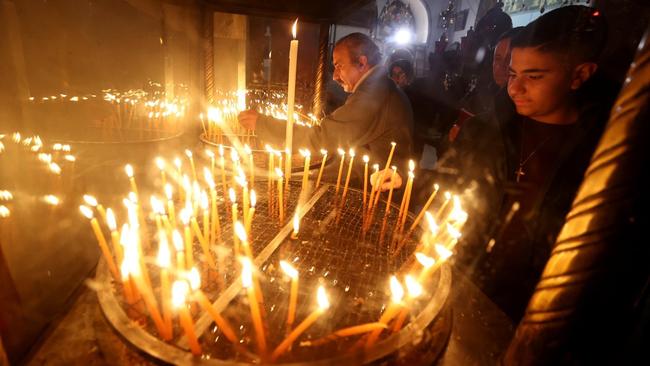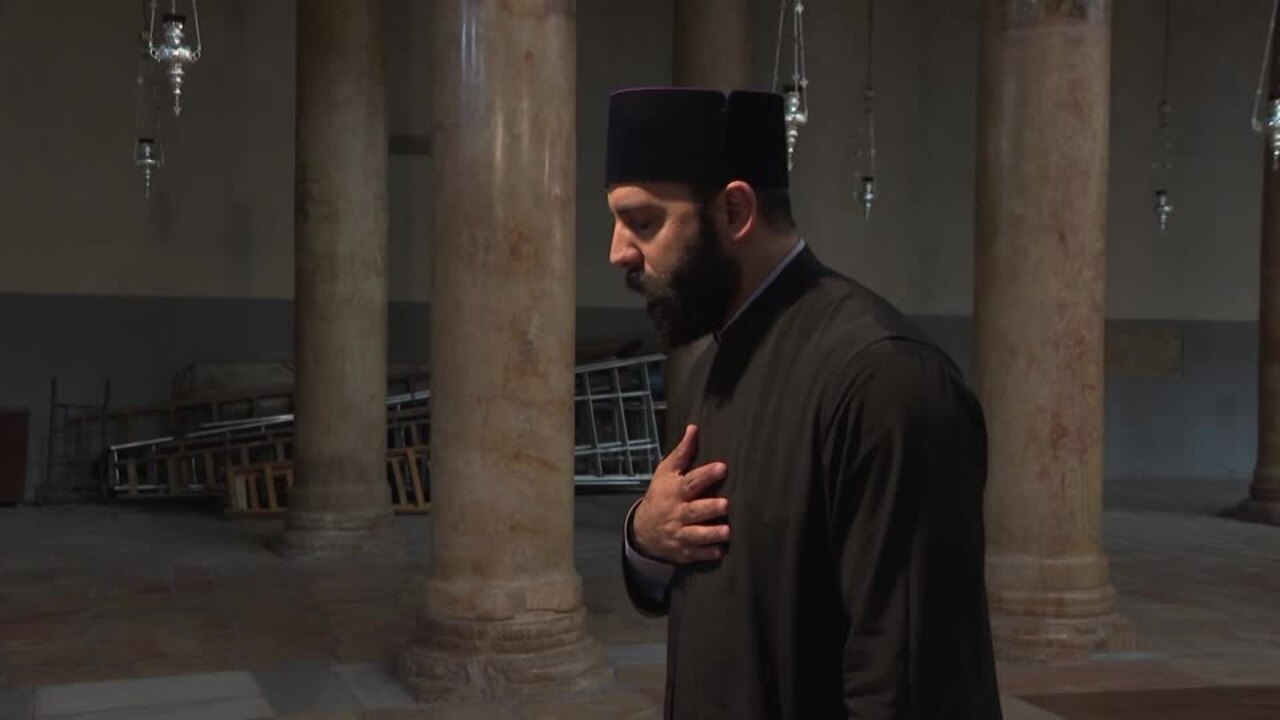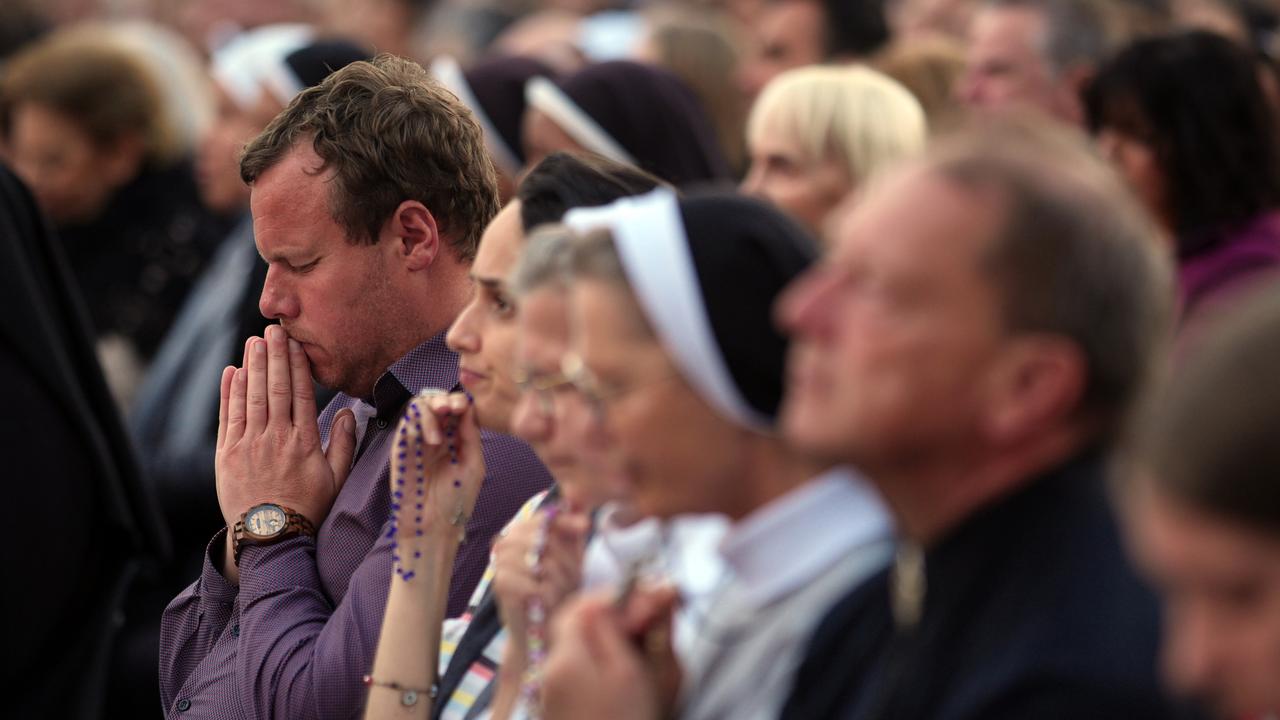Christmas cancelled for Christians in the Holy Land
Financial hardship, war and increasingly aggressive settlers are forcing the Christian community out of their ancient home.

The Persian armies that swept through Palestine in the early 7th century laid waste to every church they came to with the exception of one.
It is said that upon arriving in Bethlehem at the Church of the Nativity the conquering general, Shahrbaraz, decided to spare it when he saw a mosaic of the Three Wise Men depicted on one of the walls of the 6th-century basilica wearing Persian clothing.
Six hundred years later, the church would again narrowly escape destruction following the arrival of Sultan Baibars, who persecuted Christians and pulled down the town walls.
There are no enemies at the gates today, but the future of the Church of the Nativity is precarious all the same.
The threat is not so much military now but demographic, with the number of Christians in Bethlehem and the wider West Bank having plummeted, a trend that has only accelerated since the October 7 attack 14 months ago.
“I don’t want to keep this church as a museum for a church that once was,” said Father Issa Thaljieh, Greek Orthodox priest of the Church of the Nativity.
During his 13 years at the church, his congregation has fallen from 6,000 to 3,000. Ten families have left Bethlehem within the past few weeks.
“People are running from this place because they have no freedom, no security, no jobs,” said Thaljieh, 42, whose family have lived in Bethlehem for more than 200 years. “I try to persuade them to stay, telling them that they are the ‘living stones’ who keep this building alive with their prayers. But they do not listen. It is too difficult for them to keep on living here.”
A century ago Christians made up 85 per cent of Bethlehem’s population, a proportion that has fallen to 10 per cent today. Christians now represent less than 1 per cent of the 5 million Palestinian population.
A survey carried out before the pandemic by the Philos Project, a Christian advocacy group for the Middle East, found the primary cause for emigration from the West Bank among Christians was financial, as well as concern over Islamic extremism and discrimination.
Since the start of the war between Israel and Hamas, economic pressures have been made markedly worse by the Israeli government’s tightening of movement restrictions for Palestinians. A person living in Bethlehem who works in Jerusalem, for example, is required to obtain a travel permit which they are now far more unlikely to get.

An increasingly belligerent and emboldened Jewish settler movement also threatens to isolate Bethlehem behind a palisade of state-sanctioned settlements, including Nahal Heletz, approved this year by Bezalel Smotrich, Israel’s hard-right finance minister. In summer, armed settlers took control of a plot of land owned by the Kisiyas, a Christian family. Justin Welby, the Archbishop of Canterbury, said: “The Israeli government is not above the law and must stop acting otherwise.”
In the unfestooned streets around the Church of Nativity it is clear too the economic toll that the war has had on a town whose main business is tourism.
This is the second year that Christmas has been cancelled in Bethlehem, a direction issued by the leaders of the three patriarchates in Jerusalem in recognition of the suffering of Palestinians in Gaza, which includes a Christian community of about 1,000 people.
In front of the church is Manger Square, where usually there would be a 20ft tree, market stalls and carollers. Now there is nothing but parked cars and irate drivers sounding their horns.
Ordinarily, throughout advent between 7,000 and 10,000 visitors from all over the world would come each day to the Church of Nativity, many of them staying in the nearby pilgrim hostels and spending their money at the many gift shops and restaurants.
Some continued to come last year, Thaljieh said. But this is the first year – with the exception of the Covid pandemic – that not a single pilgrim has booked a room at the hostel, deciding either to stay outside the West Bank in Jerusalem or not to come at all.
Yesterday Hamzah, 27, who runs one of the few souvenir shops to remain open, had not sold a thing all morning until around lunchtime when a customer dropped and smashed a snow globe containing a miniature of the Church of Nativity. He would not accept a breakage fee and instead gave the man a new one for 20 shekels, equivalent to about £4.40.
“That’s probably the only thing I’ll sell today,” he said grimly. “I’ve been burning through my savings since last October. I reckon I can hang on for another six months at most, then I’ll have to sell up.”

Alaa Afteem’s hummus restaurant has also suffered, losing about 60 per cent of its income over the past year. But the question as to whether he stays in Bethlehem is not solely a financial consideration. “It’s about where you feel safe and where you feel you can live a stable life,” said Afteem, 43, a Christian, whose grandfather founded the restaurant after fleeing Jaffa after the foundation of the Israeli state in 1948.
The threat of Islamic extremism is of chief concern, and he says that were anything to happen in Palestine like the takeover in Syria by a group once linked to jihadists he would leave immediately.
The inequity of life as a Palestinian in the West Bank also weighs heavily. “The settlers can build wherever they want, but try building a house as a Palestinian and you will spend thousands only for your permit to be rejected.”
His cousin left this year to live in Australia, and Afteem predicts there may come a time when there are no Christians left in Bethlehem.
Despite the hardships, for the moment he is content to stay and will spend Christmas Eve with his family at the Church of Nativity.
“As a Palestinian I understand the suffering that is going on in Gaza and why Christmas is not being widely celebrated here this year,” he said. “But on the other hand as a Christian I feel that people have the right to celebrate and feel hopeful about the prospect of staying here.”
The Times



To join the conversation, please log in. Don't have an account? Register
Join the conversation, you are commenting as Logout